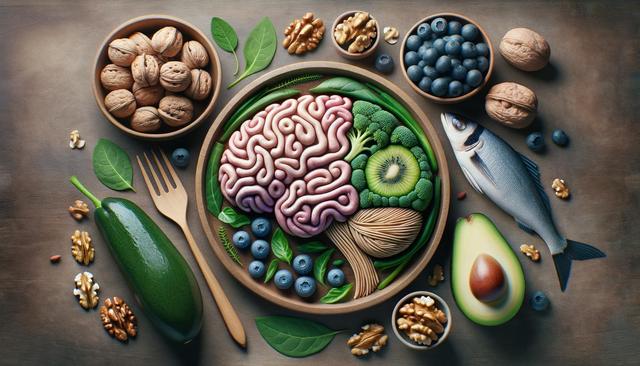The Link Between Diet and Cognitive Health
Understanding how diet may influence cognitive health and dementia is a critical step in supporting brain wellness as we age. Cognitive decline and neurodegenerative disorders like dementia are increasingly common, but emerging evidence suggests that nutrition plays a pivotal role in either accelerating or slowing these processes. Diets rich in antioxidants, healthy fats, vitamins, and minerals can help reduce inflammation and oxidative stress — two key contributors to cognitive deterioration. Conversely, diets high in processed foods, sugars, and unhealthy fats may increase the risk of memory and cognitive issues later in life.
Scientific studies have identified dietary patterns that are associated with a lower risk of dementia. These include the Mediterranean diet and other plant-forward eating styles that emphasize whole foods, healthy oils, and lean proteins. Such nutrition plans designed for brain support have been linked with better memory, sharper focus, and improved mood. By focusing on dietary quality, individuals may be able to preserve brain function and delay the onset of age-related cognitive decline.
Brain-Supporting Foods and Their Long-Term Benefits
There are specific foods that support brain function over time by supplying essential nutrients and compounds that protect and enhance neural activity. Including these foods in one’s daily meals can contribute to improved memory retention, mental clarity, and cognitive resilience.
Some of the most beneficial food options include:
- Leafy greens like spinach and kale, rich in folate and antioxidants
- Fatty fish such as salmon and mackerel, high in omega-3 fatty acids
- Berries packed with flavonoids that may improve communication between brain cells
- Nuts and seeds, which offer vitamin E and healthy fats
- Whole grains that provide steady glucose for brain energy
Consistently incorporating these foods can help reduce the risk of cognitive impairment and support overall brain health. This long-term dietary strategy aligns with wellness programs offering dietary guidance for seniors, which often include meal planning tools and nutrition education to reinforce healthy choices.
Identifying Common Nutrient Deficiencies
As people age, their bodies may absorb nutrients less efficiently, leading to shortages that can impact brain function. Several common nutrient deficiencies linked to memory decline include B vitamins (especially B12), vitamin D, omega-3 fatty acids, and iron. These nutrients are essential for maintaining neural pathways, producing neurotransmitters, and supporting brain metabolism.
Symptoms of nutrient deficiencies may include forgetfulness, confusion, difficulty concentrating, and mood changes. Recognizing and addressing these deficiencies early can prevent further cognitive decline. Seniors and caregivers should consider routine blood tests and dietary evaluations to monitor nutrient levels. Supplementation, when recommended by healthcare providers, can be a helpful tool—especially when paired with a nutrient-rich diet.
Fortunately, many nutrition plans designed for brain support include strategies to address these gaps, such as fortified foods, targeted meal preparation, and increased intake of nutrient-dense ingredients. Eating a variety of colorful fruits, vegetables, whole grains, and lean proteins can help maintain balanced nutrition and support cognitive performance throughout the aging process.
Structuring a Brain-Healthy Diet
Creating a sustainable and effective eating plan focused on cognitive health involves more than just adding a few superfoods. It requires a thoughtful structure that supports consistency and enjoyment while meeting nutritional needs. Nutrition plans designed for brain support often emphasize balance, variety, and moderation.
Key principles for structuring a brain-healthy diet include:
- Eating a rainbow of fruits and vegetables to ensure a wide range of antioxidants
- Choosing whole grains over refined carbohydrates
- Including healthy fats from sources like avocados, olive oil, and flaxseeds
- Prioritizing lean proteins such as legumes, poultry, and fish
- Reducing intake of added sugars and processed foods
These guidelines are often featured in wellness programs offering dietary guidance for seniors, where tailored meal plans and cooking classes can help reinforce healthy eating habits. When combined with regular physical activity and mental engagement, a brain-supportive diet becomes a central component of a broader strategy for aging well.
Integrating Lifestyle Changes for Cognitive Wellness
Diet is a powerful tool, but it works best when integrated with other lifestyle changes that promote healthy aging. Cognitive health is influenced by a combination of factors including physical activity, sleep quality, stress management, and social connection. Together with nutrition, these elements form a holistic approach to protecting the brain.
Lifestyle changes that promote healthy aging include:
- Regular aerobic and strength-training exercises
- Maintaining consistent sleep patterns
- Practicing mindfulness or meditation to reduce stress
- Engaging in social activities and lifelong learning
- Limiting alcohol and avoiding tobacco products
Many wellness programs offering dietary guidance for seniors are beginning to incorporate these broader lifestyle components. By encouraging a well-rounded routine, these programs support not only cognitive function but also overall well-being. When individuals adopt these habits earlier in life, they may set the stage for stronger cognitive resilience in later years, making the aging process more vibrant and fulfilling.
Conclusion: Supporting Brain Health Through Informed Choices
For older adults and those planning for later life, understanding how diet may influence cognitive health and dementia is an empowering step. By identifying foods that support brain function over time, addressing common nutrient deficiencies linked to memory decline, and embracing nutrition plans designed for brain support, individuals can take a proactive role in their mental wellness.
Furthermore, integrating lifestyle changes that promote healthy aging and participating in wellness programs offering dietary guidance for seniors can lead to measurable benefits. These informed choices, applied consistently, can help protect cognitive abilities and enhance quality of life well into the senior years.




Leave a Reply